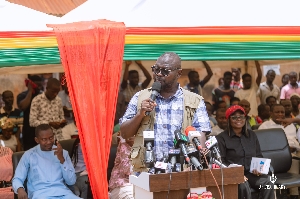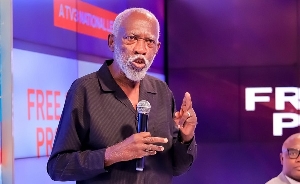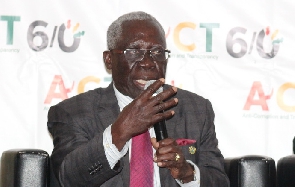 Some members of the Western Togoland separatists were recently arrested for causing havoc
Some members of the Western Togoland separatists were recently arrested for causing havoc
The Homeland Study Group Foundation (HSGF), is a separatist group championing the secession of parts of Ghana along the border with Togo.
Though the group can be found mainly in the Volta and Oti regions, not all the people in the area support their activities. This group declared independence for the territory they call ‘Western Togoland’ on November 16, 2019.
Their leader, Charles Kormi Kudzodzi, known as Papavi announced the separation of Western Togoland from Ghana after a meeting in the Volta regional capital, Ho. Many of its members have been arrested and facing prosecution.
Since then, some activities have been undertaken by this group including printing of purported currency and composing of an anthem for the supposed new state; hoisting of its flag at the Volta Regional Coordinating Council; clandestine training and recruiting young people as its military officers.
Subsequently, the Ghana Armed Forces (GAF) invaded the separatist training camp at Dodze in the Volta Region and arrested 20 people made up of 19 males and 1 female.
Fast forward, the group erected a signboard with inscriptions “Welcome to Western Togoland” for travelers heading towards Somanya from Accra, and “You are leaving Western Togoland” for travelers traveling in the opposite direction”
25th September 2020 invasion and roadblocks by Western Togoland separatist
At about 4:00GMT, news broke out on social media that the separatist group has blocked the main Sogakope-Accra road. This road is an international highway linking Ghana, Togo, Benin, and Nigeria. They mounted billboards and hosted “flags” of Western Togoland in the region. The official statement from the joint security agencies (Ghana Armed Forces and Police Service) reveals that the group attacked the Aveyime and Mepe police stations at 2:00GMT.
Also, they mounted roadblocks on the Juapong-Accra and Sogakope-Accra main roads thereby disrupting the daily activities of the citizenry. The report further discloses that there was an exchange of fire between the group and the security personnel leading to the death of a member and three persons of the separatist. The police commander for the Aveyime Police station was also wounded in the course of the operation.
According to the minister for information, the intended purpose of the group was to burn key strategic and installations which was foiled by the pre-emptive operations by the security.
The changing nature of conflicts on the African Continent
This section dissects the changing character of the warfare on the continent and the need for Ghana to collaborate with its immediate neighbour, Togo. In the 21st century, the volume and character of civil wars have declined significantly.
However, the continent is battling armed insurgencies and conflicts at the peripheries of the states. These insurgents are either fighting for succession or capture a significant territory. Their mode of operation is low, militarily weak, and factionalized but very strategic and organized in their strikes.
The large wars by fighting forces such as Biafra secessionists in Nigeria, to National Union for the Total Independence of Angola (UNITA) in Angola, Mozambican National Resistance Movement (RENAMO) in Mozambique, the Tigray People's Liberation Front (TPLF) in Ethiopia, the Eritrean People’s Liberation Front (EPLF) in Eritrea, the Sudan People's Liberation Movement (SPLM) in Sudan, the National Resistance Movement (NRM) in Uganda and the Rwandan Patriotic Front (RPF) in Rwanda are few and far between in contemporary sub-Saharan Africa.
However, armed insurgencies are on the rise on the African Continent. These insurgents are typically operating at the peripheries and borders of the states.
These include the Ugandan state fighting the Lord’s Resistance Army in northern Uganda; the Chadian and Central African Republic governments fighting insurgencies on their peripheries in the east; the Ethiopian government fighting in the Ogaden region; the Namibian government fighting against a separatist movement in the Caprivi Strip; the Sudanese government fighting rebel groups in Darfur (and Darfurian rebel groups fighting each other); Tuareg insurgencies in northern Mali and Niger; the Casamance insurgency in Senegal; the Cabinda separatists fighting in Angola; and Boko Haram in Nigeria, among other armed conflicts.
Is western Togoland an insurgent movement and a threat to national security?
As an African Studies student and scholar in Politics and development, I will classify this group as an insurgent movement for some reason. As such, their activities are a threat to peace and development in Ghana.
First, insurgent or separatist movements normally have a warlord as its leader. The leader coordinates the group’s activities and can mobilize loyal armed forces. Such leaders command loyalty and commitment from the members of the group. For instance, UNITA had Jonas Savimbi, EPLM had Isaias Afwerki, etc. The Western Togoland has Charles Kormi Kudzodzi, known as Papavi who has these qualities.
Second, Western Togoland separatists are capable of achieving political legitimacy and breaking away from Ghana with time. Due to youth unemployment, separatists can recruit more young people in their militia to pursue their objectives by promising them jobs.
Under this pretense, the Western Togoland were recruiting young people into their militia. They were promised to be enlisted in the Ghana Army only to be found at Dodze, the base of the group. This enables separatists to expand into a large movement with a strong militia base. Except for Biafra secessionists, all the large insurgent movements mentioned have achieved their political objectives.
For instance, EPLM managed to secede Eritrea from Ethiopia in 1993, the RPF armed wing defeated government forces in 1994 to get political authority in Rwanda, the NRM and its armed forces overthrew Obote’s regime in 1986 in Uganda, the SPLM succeeded in breaking South Sudan from Sudan, the activities of UNITA forced the government of Angola to sign the peace agreement with them in 2002. This is because they may recruit more young people in their militia to pursue their objectives.
Third, insurgents’ activities occur on the periphery of states and are difficult to end because they are mobile and factionalized armed groups. They have strong cross-border dimensions; drawing funds from illicit trade, banditry, and/or international terrorist networks. Western Togoland members are operating from a peripheral and southeastern border of Ghana.
For instance, the training camp where their militia were been trained is a border town and almost in Togo. Consequently, their leaders run away to the Togo side of the border upon sensing danger from Ghana security.
Finally, the 25th September 2020 dawn operation by the members is typical of insurgent movements. Though, the security report discloses prior intelligence and pre-emptive operations, yet, the members carried security threatening activities.
In all their modus operandi, none of their operations has been devasted than the stated date. The members were able to attack and captured two police stations, blocked major highways for several hours. As if that is enough, they exchanged fire with the joint armed police and military leading to casualties and injuries.
One of the members posited:
we are here to defend our land so at the police stations we told them our land has been declared for independence. We have blocked the road to claim our land and we wanted to prove to them for the whole world to hear us on what we have declared. Soldiers can come, we are still waiting for them. (Ref: Graphic Online)
This assertion can only be made by a determined and purposeful member of a separatist group. Therefore, apart from local from intelligence and security measures, Ghana needs to collaborate with Togo to deal with the peripheral activities of the group.
(next part 2: Dealing with Separatist movement)
The writer is a Ph.D. Candidate in African Studies at the Institute of African Studies, University of Leipzig, Germany/KNUST, Ghana.
References
https://www.ghanaweb.com/GhanaHomePage/NewsArchive/Soldiers-arrest-20-Western-Togoland-rebels-in-Dodze-868795
Myjoyonline
Straus, Scott (2012). ‘Wars Do End! Changing Patterns of Political Violence in Sub-Saharan Africa’, African Affairs, 111(443):179-20












